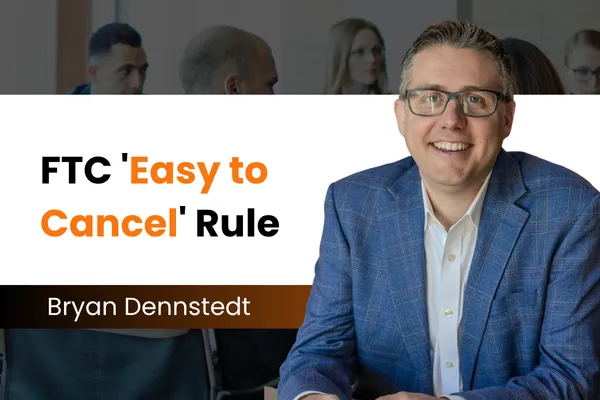
The “Easy to Cancel” Rule: What It Means for Consumers and Businesses
Introduction:
We’ve all been there—excited to subscribe to a new service, but when it’s time to cancel, the process feels like running a marathon. You navigate endless pages, answer intrusive questions, or find out that you need to call customer service just to cancel online subscriptions.
To tackle this frustrating issue, the Federal Trade Commission (FTC) introduced the "Easy to Cancel" Rule, a new regulation designed to protect consumers from unfair subscription practices. But what does this rule mean, and how will it affect consumers and businesses? Let’s dive in.

What Is the "Easy to Cancel" Rule?
The Easy to Cancel Rule is part of the FTC’s broader efforts to regulate negative option billing, where customers are automatically charged unless they take action to cancel. The new rule, proposed in March 2023, requires businesses to offer a simple cancellation process that mirrors the way consumers initially signed up—online or otherwise. If you subscribed with a few clicks, you should be able to cancel with the same ease.
This rule applies to a wide range of services, including:
Streaming platforms (Netflix, Hulu, etc.)
Gym memberships
Subscription boxes (like meal kits or beauty boxes)
Key Requirements of the Rule
Easy Cancellation:
The cancellation option must be accessible through the same platform used for the subscription. For example, if you signed up online, you shouldn’t be forced to cancel over the phone.
Equivalent Simplicity:
Cancelling should not involve more steps than subscribing. If the signup process took three clicks, the cancellation process should be equally straightforward.
Reminders Before Renewal:
Businesses must send reminders or notices before automatically renewing subscriptions, especially for services with yearly or long-term commitments.
No Hidden Tricks:
Companies are prohibited from manipulating users with confusing options, upsells, or “are you sure?” loops during the cancellation process.

Why Is the "Easy to Cancel" Rule Important?
Consumer Empowerment:
The rule strengthens consumers' rights by ensuring they can easily manage subscriptions without unnecessary hassle. It eliminates the common experience of getting stuck in a labyrinth of obstacles when trying to cancel.
Prevents Dark Patterns:
“Dark patterns” are manipulative design tricks that make it difficult to opt out or cancel a service. The new rule is designed to eliminate these practices, giving consumers clear choices.
Transparency and Accountability:
With companies required to provide renewal reminders, consumers are less likely to be charged for subscriptions they forgot about.
What It Means for Businesses
Businesses that rely heavily on subscription models will need to adjust their processes. Here’s what they need to do:
Audit cancellation flows to ensure compliance with the new rule.
Provide clear notices about automatic renewals to avoid complaints.
Train customer service teams to handle cancellations efficiently without upselling or obstructing users.
Non-compliance could lead to FTC enforcement actions, including fines and reputational damage.
How Will This Impact Subscription Models?
The "Easy to Cancel" rule may force companies to rethink their subscription strategies. Some businesses have relied on friction-heavy cancellation processes to retain customers. With these obstacles removed, companies will need to focus on improving service quality and offering genuine value to retain subscribers voluntarily.
While the transition may be challenging, it could also inspire businesses to innovate their services. This shift towards consumer-friendly practices may foster higher customer satisfaction and trust in the long run.

Conclusion
The FTC's Easy to Cancel Rule is a win for consumers tired of fighting to end subscriptions. It aims to ensure transparency, simplicity, and fairness in subscription services, ultimately encouraging businesses to prioritize value over manipulative tactics.
With this rule in effect, both consumers and companies will need to adapt. But one thing’s for sure: cancelling a subscription will no longer be a chore—and that’s a change worth celebrating.
Are you tired of subscription traps? Have you experienced tricky cancellations before? Share your thoughts.
Enjoyed this post? Follow us for more insights on consumer rights and business trends!







